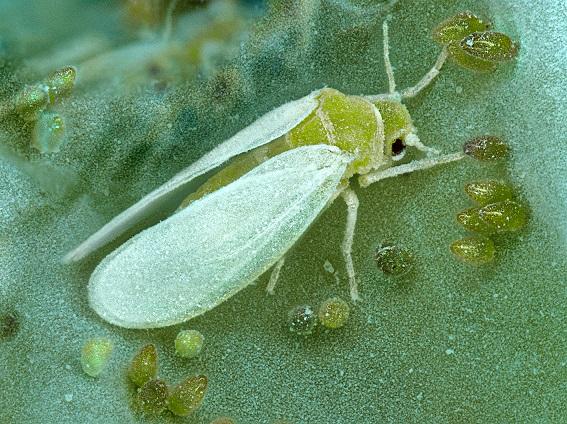- Home
- Worldwide
- CIRAD worldwide
- Projects
- GeMed project
Prevention and control of new and invasive geminiviruses affecting vegetables in the Mediterranean - GeMed

Adult and eggs of the whitefly Bemisia tabaci, a geminivirus vector © A. Franck, CIRAD
Issues
Tomatoes and cucurbits are major market garden crops in the Mediterranean. The fact that they are grown year-round, with a limited number of varieties, makes them vulnerable to emerging and invasive pathogens such as viruses. Geminiviruses are a particular issue, due to the economic losses they cause, the frequency of introduction of new species in the region, and the emergence of potentially invasive recombinant strains that may be capable of overcoming resistance genes. GeMed aims to improve prevention and control of such attacks through cooperation between virologists, entomologists, geneticists, breeders and bioinformaticians.
Description
The project’s activities focus on four pillars. The first is mapping geminivirus distribution, either by testing for viruses already identified in the Mediterranean or using an unbiased approach to detect new potentially invasive strains or species. The second centres on a watermelon geminivirus that could potentially infect a wide range of plants, the vector of which has not yet been identified. The aim is to detect and identify the insect concerned and study its ecology. The third pillar is understanding recombinant virus invasions, both through field surveys and by analysing virus-plant interactions under controlled conditions. Lastly, the fourth pillar aims to design and improve virus control techniques that respect the environment, using a range of approaches.
Expected changes
- Mapping geminiviruses in the Mediterranean, will have made it possible to target viral infection prevention and control more effectively. Seed producers and technical institutes will be able to use the resulting maps to tailor virus control to each country or region.
- The discovery of the as-yet unknown vector of the watermelon virus will have been a major step forward for virus control.
- Knowing the virus-plant interactions associated with recombinant geminivirus invasions should serve to identify new resistance alleles for use in varietal breeding.
- Demonstrations under controlled conditions of plant vaccination using small RNAs should open up prospects for a rollout on a larger scale.
- Combinations of integrated management techniques will have been proposed.
Expected impacts
- Reduced pesticide residues in market garden crops.
- A broader range of geminivirus prevention and control techniques.
Contract partners
- Gautier Semences(France)
- Institute for Sustainable Plant Protection
- National Research Council (IPSP-CNR - Italy)
- ESASEM SPA (Italy)
- Al-Balqa’ Applied University, Biotechnology Department(Jordan)
- Institut national de recherche agricole (INRA – Morocco)
- Institut national de recherche agricole de Tunisie (INRAT - Tunisia)























